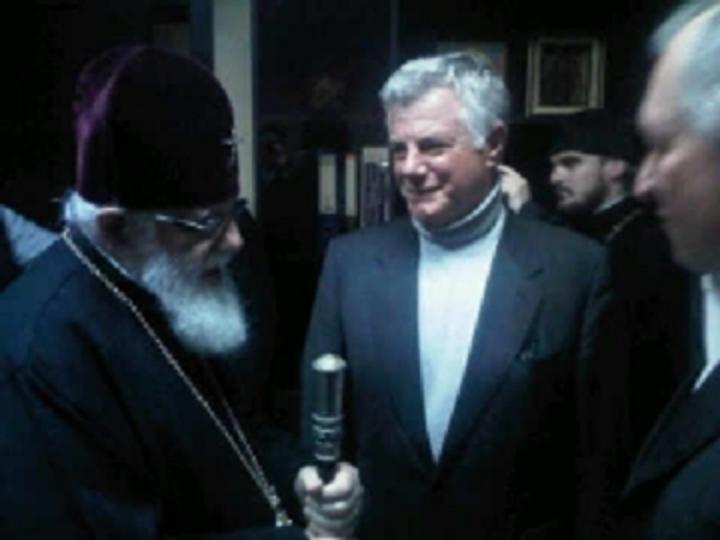
Israeli Bribery Case Dampens Georgia-Israel Diplomatic Relations
Publication: Eurasia Daily Monitor Volume: 8 Issue: 99
By:

(Part One)
Georgian-Israeli relations are in crisis, and the recent decision by Georgian President Mikheil Saakashvili not to pardon two Israeli businessmen jailed after a Georgian court found them guilty of bribery is not going to improve the situation in the near future. The incident has already become an international scandal (24 Saati, May 12).
At the end of April, Archil Kbilashvili, the defense lawyer for the two convicted Israelis, Rony Fuchs and Ze’ev Frenkiel, who denied the charges, announced that their families had sent President Saakashvili a letter requesting that he pardon the two men on the grounds of their age and health condition. They had already received a visit from the head of the Georgian Orthodox Church, Ilia II, who wished them an early release (www.civil.ge, April 21).
On April 1, Fuchs and Frenkiel were found guilty by the Tbilisi City Court for offering a bribe to Georgian officials in the Ministry of Finance. Fuchs was sentenced to seven years in prison and fined $300,000, while Frenkiel received six years in prison and a $60,000 fine, which like Fuchs’ will be paid into Georgia’s state budget. The furor surrounding the cases grew rapidly and is now spoiling the relations between the two states, although the Georgian foreign ministry denies the two cases are hampering diplomatic relations with Israel.
Ron Fuchs, an oil trader, visited Georgia for the first time in 1991 with the intention of investing millions of dollars in the newly independent country, which had all the features of a dysfunctional economy including rampant corruption. At the time, he met with Georgian government officials, such as the head of “SakNavtobi” (the National Oil and Gas Company of Georgia). During one of these meetings, he asked to see the pipeline network structure in Georgia. About one year later, his company, Tramex, under unclear circumstances, somehow clinched the exclusive rights to operate a pipeline passing through Georgia. This deal was concluded even though Tengiz Sigua, representative of the Georgian government at the time, had warned the government not to issue any exclusive right to individuals or companies.
In 1996, when British Petroleum (BP) first entered the Georgian energy market, the Georgian authorities, under the new leadership of Edward Shevernadze, tore up the contract with Tramex and handed the management of the pipelines back to SakNavtobi. This decision prompted Fuchs and his Greek partner, Ioannis Kardassopoulos, to sue the Georgian government in the International Center for Settlement of Investment Disputes (ICSID), which rendered its ruling in March 2010 after several years of litigation. It ordered the Georgian government to pay $98 million to Fuchs and Kardassopoulos for reneging on the exclusive rights on the pipeline (Kviris Palitra, April 4).
Showing reluctance to abide by the judgment handed down by the ICSID, the Georgian Ministry of Finance entered into negotiations with the two Israeli businessmen to reach an out-of-court settlement. Initiated by the Georgian Authorities themselves, these negotiations were an attempt to reduce the sum to pay from $98 million to within the range of $50 million to $85 million.
A meeting took place at a hotel in Istanbul, Turkey on September 15, 2010. Fuchs and Fenkiel agreed to receive $72 million from the Georgian government instead of the $98 million that the ICSID had set in its verdict. The motivation which persuaded Fuchs to settle for a substantially smaller sum was that he would be paid immediately. Out of the $72 million, the sides apparently agreed that $7 million would be used by the Georgian government (or the Georgian Prime Minister, it is not clear) to explain to the Georgian public, in a public relations campaign, why the state has to compensate Fuchs and his partners with such a substantial amount of money. Georgian and British lawyers drafted the text of the alleged final settlement.
An important aspect in the case is that Georgian officials covertly videotaped the meeting, seemingly in an effort to later implicate the Israeli citizens and the Greek for bribery. Indeed, on the videotape, while Fuchs and Fenkiel are in discussions with Georgian Deputy Finance Minister Avtandil Kharaidze, the latter presses Fuchs to make a side-payment and to acknowledge that he is offering a bribe—the $7 million for the “PR campaign”—to the Georgian government. A Turkish law expert found that Georgian agents had violated Turkish law in using covert and unauthorized surveillance equipment. When the Turkish government was informed of the case and the method used by Georgian authorities during the meeting, it issued a warning to Georgia in protest (Kviris Palitra, April 18).
Even though the agreement had been drawn up by the lawyers, it seems Fuchs and Kardassopoulos did not trust the Georgian authorities and asked for some more guarantees. On October 14, 2010, Fuchs and Frenkiel, who contrary to Kardassopoulos trusted the Georgian authorities and especially the Prime Minister Nika Gilauri, met again with Kharaidze in Batumi, a seashore city on the Black Sea, to confirm their readiness to pay $7 million for the PR campaign. Gilauri lured the two men to Batumi with a hand-signed invitation letter, requesting them to arrive in Georgia as his private guest. In the letter, Gilauri describes in the most favorable terms Fuchs’ business activities in Georgia and promises that the Georgian government would sign their agreement reached on September 15.
The businessmen’s meeting with the Georgian Prime Minister in Batumi was scheduled to begin at 2:00 pm. The meeting never took place. Instead, at 2:00 pm, officers from the Constitutional Security Department of the Ministry of Internal Affairs of Georgia arrested them in what seemed to be a carefully orchestrated police operation.
According to the statement by the Georgian Prosecutor-General’s Office, the investigation has evidence that the company paid a bribe to Georgian high-ranking officials in the 1990’s to get 30-year exclusive pipeline rights. The statement also incriminated Fuchs in allegedly offering $7 million (out of the $72 million) to Kharaidze as a bribe. The Israeli businessmen categorically denied offering or alluding to the possibility of paying a bribe to Kharaidze (www.civil.ge, January 5).
The trial dragged on for three months and Fuchs’ lawyers were not permitted to question any key witnesses in the case. Furthermore, the court refused almost every defense request to provide evidence and witnesses. The Prosecutor-General’s Office provided evidence alleging that the company paid a bribe in 1992 to obtain its 30-year right to operate the pipeline network. The Georgian officials who were allegedly bribed by the Israel businessmen in 1992, however, were never subpoenaed to appear in court to present evidence or to be cross examined (24 Saati, January 12). Kbilashvili, the defendants’ lawyer, will appeal against the verdict of the Tbilisi Civil Court to the European Court of Human Rights. He told journalists after the verdict that the decision came as no surprise, as courts seldom announce verdicts of not guilty in Georgia.
For the Georgian authorities, releasing these two men would mean that the Georgians are tacitly admitting they were holding the businessmen illegally from the onset. Also, the Georgian government’s refusal to pay the defendants, and President Saakashvili’s decision to decline a request for pardon, are likely linked with the difficult state of the Georgian budget and with the upcoming parliamentary elections scheduled for 2012. A settlement of $98 million would take away substantial financial resources about a year before the most important legislative election for the ruling National Movement Party, headed up by president-elect Saakashvili.




